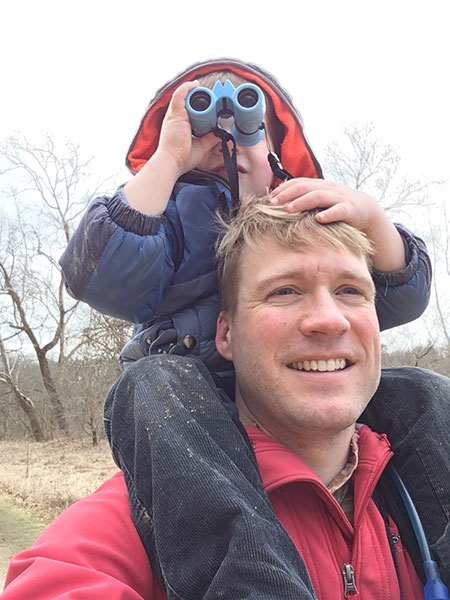
Andrew Bishop ’05

Andrew Bishop remembers a family camping trip to Yellowstone National Park when he was seven years old as the moment when “I knew that I wanted to work for the National Park Service.” By the time he came to Wooster, the northeast Ohio native was working summers at Cuyahoga Valley National Park. His I.S. project examined the effects of environmental pollution on lichen populations in Wayne County compared to those in the Cuyahoga Valley, and it provided “a good base of fundamentals of conservation biology.”
After graduating with a degree in biology, he spent several seasons with the park service in Grand Teton National Park in Wyoming, before returning to Cuyahoga Valley as a full-time biologist and coordinator of exotic plants. The 33,000-acre park, created in 1974, encompasses land that was once home to farms, businesses, mines, and canals.
One of Bishop’s responsibilities was to develop and execute restoration strategies for individual sections of the park. With vision, a carefully thought out plan, and thousands of hours of volunteer labor, an abandoned quarry choked with 15-foot-high swathes of autumn olive, garlic mustard, and other invasive species, could be transformed into a landscape filled with native prairie grasses and flowers, sown from seeds collected from the array of native plants that Bishop nurtured in a greenhouse next to his office at the park.
After five years at Cuyahoga Valley, Bishop decided to leave the National Park Service in 2016 for a new position as a restoration ecologist with a native plant nursery called Native Roots, Inc., a start-up run by two sisters, one of whom he had worked with in the park service.
“We are a plant nursery and consulting group that emphasizes plants native to Ohio,” Bishop says. “We work with federal, state, and local parks as well as private landowners to improve the ecological quality of their properties and we supply locally adapted plant materials.”
Bishop and his colleagues at Native Roots consult with property owners to determine their needs. Do they want to make the property more ecologically stable? More wildlife friendly? They then develop a plan around the right combination of native species to achieve that goal, and manage the project to completion. He has a small nursery at home where he can start seedlings before transporting them to the company’s main operation in Richfield.
The opportunity to join Native Roots came along just after Bishop and his wife, fellow Wooster grad Elaine Morgan Bishop, had their second child, and the flexibility provided by working at home has allowed him to take on more of the childcare and “home stuff.” But that’s not the only benefit.
“There are fabulous gems in the National Park Service,” Bishop says, “but they are oases, and the problems come from upstream, literally and figuratively. For effective conservation biology, you really need scale.” And to achieve that scale, you ultimately need what Native Roots aims to do. “It’s about getting wild habitat out into the suburbs, not just in preserved areas.”
Posted in Alumni on October 22, 2018.
Related Posts
Related Areas of Study
Biology
Explore molecular and cellular biology, ecology and more with top faculty and access to extensive lab facilities.
Major Minor

